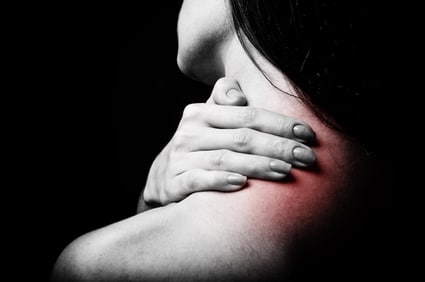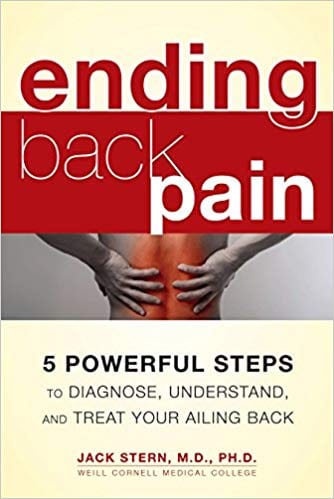The National Institute of Health reports that 80 percent of adults experience back pain, with one in four suffering from it at least one day every three months. Risk factors include age, fitness level, diet, heredity, race, disease, smoking status, and work-related risks. Many instances are stress-related.
Baby Boomers are beginning to feel the effects of stress-related back pain as they age. Those who are overweight, not physically fit, or physically inactive are more prone, as are people with a hereditary predisposition to arthritis that affects the spine or other spinal conditions. Lifestyle conditions that cause it include jobs lifting, pushing, pulling, or sitting all day.

Causes of stress-related back pain
If you ask anyone, they’d probably say they’re no strangers to stress. Doctor Sarno termed stress-related back pain as Tension Myositis Syndrome, (TMS) and attributed stress-related back pain to be a result of unconscious emotions including anger and rage. It’s common in people with strong drives to succeed, who take responsibility, and who are strongly self-disciplined and motivated. Some are also inclined to be compulsive and self-critical. He claims these impulses cause physical changes that cause back pain, such as constricted blood vessels, a decrease in oxygen to the spinal area, and a buildup of waste products in muscles.
These physical changes, brought on by emotional stress, in turn, cause muscle tension, spasms, and back pain that lead sufferers to seek treatment from specialists. The National Institute of Mental Health reports that there are different kinds of stress, including routine stress, sudden negative stress, and traumatic stress, but the body responds to it in similar ways, including emotional and physical reactions.
Back pain is related to anxiety
Pain is a common symptom of anxiety, according to the Anxiety and Depression Association of America. The Association reports that people with conditions like arthritis commonly experience anxiety, depression, and mood disorders and that people with anxiety disorders commonly experience back pain from illness, accidents, and infections. While anxiety disorders are difficult to treat, the ADAA reports that treating anxiety can also relieve accompanying pain. Everyone experiences stress at some point, but the important part is to seek treatment before it causes you more harm.
Anxiety treatments that will relieve your aching back
The ADAA also reports that medication, cognitive-behavioral therapy, relaxation techniques and lifestyle changes prescribed for anxiety may relieve back pain. While cognitive-behavioral therapy isn’t specifically for pain relief, the way it changes how patients feel about their condition by giving them a feeling of control over their situation helps relieve psychosomatic symptoms.
Lifestyle changes that can reduce stress and back pain are easier to implement in small steps. Exercise, sleep, and proper nutrition can all be brought into your life one day at a time. Those who change their lifestyle completely overnight find it can exacerbate their stress and anxiety, making the situation worse. Do your research and find more ways to find relief from back pain.
Ending back pain due to stress
An excellent book to help you cope with back pain in any form is called Ending Back Pain: 5 Powerful Steps to Diagnose, Understand, and Treat Your Ailing Back by Jack Stern, M.D., Ph.D. He offers scientifically grounded solutions including stress-related techniques as well as diagnostic self-tests, research, case studies, and treatment options.

Do you have stress-related back pain? How do you deal with it? Please leave a comment.




I have had issues with back pain for some 10.years now due to mild sciolisis, a sedentary job and-yes, stress. I have found some relief from deep tissue massage but it isn’t enough.
Sedentary work can really take a toll. I find I need to get up and walk, stretch, or move in some way. Massage is always good. I need one right now!
I had back pain during the last few years of my career, due to stress. It went away after I retired. Now it’s coming back due I think to age rather than stress. Either way, the only way I’ve found to treat it effectively is by losing weight (I took off about 15 pounds after I retired) and through stretching and strength exercises. Still acts up occasionally, but I think I’ve got it under control, at least for the time being. B and I do go for a massage every now and then. Does it help? Hard to tell. But it’s worth it anyway!
Those are great tips, Tom. Excess weight is a big factor and we always need to stay flexible. I love massages and would love one right now! LOL
Unfortunately, my back pain is related to arthritis in the low back. Getting out of bed in the morning is actually the worst part of it. My husband will put some China Girl on my low back and it really helps to loosen it up so I can face the day. Also, Yoga poses like Down Dog really help to stretch out the back and relieve some of the pain.
I know the feeling Jennifer.I just took a fall walking my dogs and ouch! I haven’t tried China Girl. Is it similar to Tiger Balm? Sounds like something to check out.